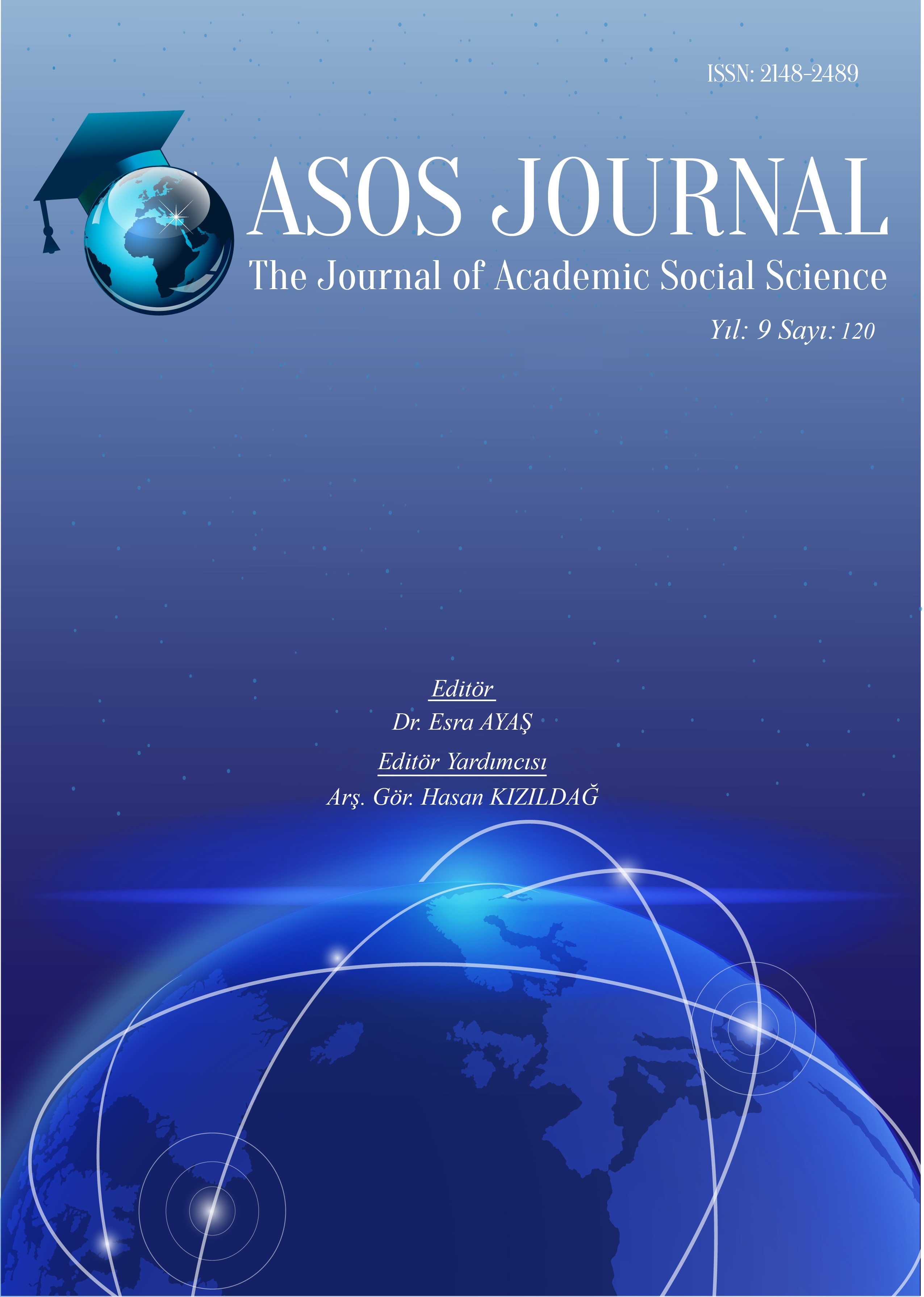Author :
Abstract
Bu çalışmada hedeflerin değişmezliği algısı ile iş performansı arasındaki ilişki ve bu ilişkide algılanan iş özerkliğinin aracı rolünün incelenmesi amaçlanmıştır. Çalışma örneklemi 197 kamu çalışanından oluşmaktadır. Kamu çalışanlarının göstermiş olduğu, gün geçtikçe önemi artan ve sürekli olarak sorgulanan iş performansı ile iş özerkliği kavramlarının önemi vurgulanmıştır. Bununla birlikte faaliyetlerini yoğun mevzuat altında sürdüren kamu çalışanlarının iş performansı üzerinde etkili olabileceği düşünülen hedeflerin değişmezliği algısı kavramı incelenmiştir. Araştırma sonuçları hedeflerin değişmezliği algısının iş özerkliği ve iş performansını artırdığını göstermektedir. Korelasyon bulgularına göre hedeflerin değişmezliği algısı ile iş performansı arasında zayıf, iş özerkliğinin ile ılımlı bir ilişki vardır. Regresyon analizi bulguları ise hedeflerin değişmezliği algısı ile iş performansı arasındaki ilişkide iş özerkliğinin tam aracı rolü olduğunu göstermektedir. Araştırmada yer alan değişkenler arasındaki ilişkiler dikkate alındığında, örgüt tarafından belirlenen hedeflerin çalışanlar tarafından değişmez kural bir olarak benimsenmesinin iş performansına katkı sağladığı söylenebilir.
Keywords
Abstract
In this study, it is aimed to examine the relationship between perception of the goals as invariable and work performance and the mediating role of perceived job autonomy in this relationship. The study sample consists of 197 public employees. Emphasis has been placed on the concepts of work performance and job autonomy, which is increasingly important and constantly questioned by public employees. In addition, the concept of the perception goals as invariable, which is thought to be effective on the work performance of public employees who continue their activities under intense legislation, has been examined. The results of the research show that the perception of the goals as invariable increases job autonomy and work performance. According to the correlation findings, there is a weak relationship between the perception of the goals as invariable and work performance, and a moderate relationship with job autonomy. The regression analysis findings, on the other hand, show that job autonomy has a full mediating role in the relationship between the perception of the goals as invariable and work performance. Considering the relationships between the variables in the research, it can be said that the adoption of the goals determined by the organization as an unchanging rule by the employees contributes to the work performance.
Keywords
- Baron, R.M., Kenny, D.A (1986 )The Moderator-Mediator Variable Distinction in Social Psychological Research: Conceptual, Strategic, and Statistical Considerations, Journal of Personality and Social Psychology 1986, Vol. 51, No. 6, 1173-1182.
- Brymer, R.A.(1991), Employee Empowerment: A Guest-Driven Leadership Strategy. The Cornell Hotel, Restaurant Administiration Quarterly, 32(1):58-68.
- Çukurçayır, M.A. Eroğlu, H.T. (2005) Yerel Yönetimler ve Performans Denetimi, Yerel Yönetimler Üzerine Güncel Yazılar I, Ed. H.Özgür- M.Kösecik, Nobel, Ankara.
- Dysvik, A., Kuvaas, B. (2011). Intrinsic motivation as a moderator on the relationship between percieved job autonomy and work performance. European Journal of Work and Organizational Psychology, 20(3), 367–387.
- Erdem, H., Gökmen, Y., Türen, U. (2016). Psikolojik Güçlendirme Boyutlarının İş Performansı Üzerine Etkisinde Örgütsel Bağlılığın Aracılık Rolü: Görgül Bir Araştırma. Doğuş Üniversitesi Dergisi, 17 (2) 2016, 161-176.
- Gagne, M., Deci, E. L. (2005). Self-determination theory and work motivation. Journal of Organizational Behavior, 26, 331–362.
- Gelfand, M. J., Nıshıı, L. H. ve Raver, J. L. (2006). On the Nature and Importance of Cultural Tightness and Looseness. Journal of Applied Psychology. 91: 1225-1244.
- Gupta, O. P. (1982), Commitment to Work of Industrial Workers, Concept Publishing Company New Delhi.
- Hackman, J. R., Oldham, G. R. (1976). Motivation through the design of work: Test of a theory. Organizational Behavior and Human Performance, 16, 250-279.
- Hofstede, G. (1984), Cultural Differences in Management and Planning, Asia Pacific Journal of Management, 1, 81-99.
- Huı, C. H., Yee, C. (1994) The Shortened Individualism–Collectivism Scale: Its Relationship to Demographic and Work Related Variables. Journal of Research in Personality, (28), 409-424.
- Kuvaas, B. Buch, R. Dysvik, A. (2014). Performance Management: Perceiving Goals As İnvariable And İmplications For Perceived Job Autonomy And Work Performance. Human Resource Management, May–June 2016, Vol. 55, No. 3. Pp. 401–412.
- Latham, G. P., Almost, J., Mann S., Moore, C. (2005). New developments in performance management. Organizational Dynamics, 34(1), 77–87.
- Morgesen, F. P., Reide, M. H., Campion, M. A. (2005). Selecting individuals in team settings: The importance of social skills, personality characteristics, and teamwork knowledge. Personnel Psychology, 58(3): 583-611.
- Morgeson, F. P., Humphrey, S. E. (2006). The work design questionnaire (WDQ): Developing and validating a comprehensive measure for assessing job design and the nature of work. Journal of Applied Psychology, 91(6), 1321–1339.
- Oyserman, D., Coon, H. ve Kemmelmeier, M. (2002), Rethinking individualism and collectivism: Evaluation of theoretical assumptions and meta-analyses, Psychological Bulletin, 128(1), 3-72.
- Parker, S. K., Bindl, U. K., Strauss, K. (2010). Making things happen: A model of proactive motivation. Journal of Management, 36(4), 827–856.
- Rotundo, M., Sackett, P.R. (2002), The Relative Importance of Task, Citizenship, and Counterproductive Performance to Global Ratings of Job Performance: A Policy Capturing Approach. Journal of Applied Psychology, 87, 66−80.
- Sakal, Ö. AYTEKİN, İ. (2014). Bireycilik- Toplulukçuluk Değerlerinin Başarı Amaç Yönelimlerine Etkisi Üzerine Karşılaştırmalı Bir Araştırma. KAU IIBF Dergisi, 5(8), 45-66.
- Sakal, Ö. (2015) Kültürün Bireycilik Toplulukçuluk Boyutlarının Tükenmişlik Boyutları Üzerindeki. Erzincan Üniversitesi/Sosyal Bilimler Enstitüsü, Erzincan.
- Schermerhorn, J.R., Hunt, G., Osborn, R.N. (1985), Managing Organizational Behavior. John & Sons Publishing, New York.
- Schwartz, R. C. (2001) Introduction to the Internal Family Systems Model, Trailheads Publications, Oak Park.
- Spreıtzer, G. M. (1996). Social structural characteristics of psychological empowerment. Academy of Management Journal, 39(2), 483-504.
- Spreıtzer, G. M. (1995). Psychological empowerment in the workplace: dimensions, measurement, and validation. Academy of Management Journal, Vol.38, no.5, pp.14421465.
- Triandis, H.C. (1994), Theoretical and methodological approaches to the study of collectivism and individualism. Individualism and Collectivism: Theory, Method, and Applications, Sage Publication, London.
- Wasti, A., Erdil, S.E. (2007) Bireyci ve Toplulukçuluk Değerlerinin Ölçülmesi: Benlik Kurgusu ve Indcol Ölçeklerinin Türkçe Geçerlemesi, Yönetim Araştırmaları Dergisi, 7(1), 39-66.
